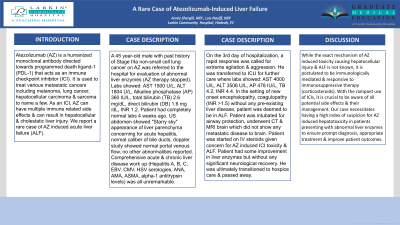Sunday Poster Session
Category: Liver
P1107 - A Rare Case of Atezolizumab-Induced Liver Failure
Sunday, October 22, 2023
3:30 PM - 7:00 PM PT
Location: Exhibit Hall

Has Audio

Annie Shergill, MD
Larkin Community Hospital
Miami, FL
Presenting Author(s)
Annie Shergill, MD1, Luis Nasiff, MD2
1Larkin Community Hospital, Miami, FL; 2Larkin Community Hospital, Palm Springs Campus, Miami, FL
Introduction: Atezolizumab (AZ) is a humanized monoclonal antibody directed towards programmed death ligand-1 (PDL-1) that acts as an immune checkpoint inhibitor (ICI). It is used to treat various metastatic cancers including melanoma, lung cancer, hepatocellular carcinoma & sarcoma to name a few. As an ICI, AZ can have multiple immune related side effects & can result in hepatocellular & cholestatic liver injury. We report a rare case of AZ induced acute liver failure (ALF).
Case Description/Methods: A 45 year-old male with past history of Stage IIIa non-small cell lung cancer on AZ was referred to the hospital for evaluation of abnormal liver enzymes (AZ therapy stopped). Labs showed: AST 1500 U/L, ALT 1804 U/L, Alkaline phosphatase (AP) 360 IU/L, total bilirubin (TB) 2.6 mg/dL, direct bilirubin (DB) 1.6 mg /dL, INR 1.2. Patient had completely normal labs 4 weeks ago. US abdomen showed "Starry sky" appearance of liver parenchyma concerning for acute hepatitis, normal caliber of bile ducts, doppler study showed normal portal venous flow, no other abnormalities reported. Comprehensive acute & chronic liver disease work up: Hepatitis A, B, C, EBV, CMV, HSV serologies, ANA, AMA, ASMA, alpha-1 antitrypsin level all unremarkable. On 3rd day of hospitalization, a rapid response was called for extreme agitation & aggression. He was transferred to ICU for further care where labs showed: AST 4000 U/L, ALT 3506 U/L, AP 478 IU/L, TB 4.2, INR 4.4. In the setting of new onset encephalopathy, coagulopathy (INR >1.5) without any pre-existing liver disease, patient was deemed to be in ALF. Patient was intubated for airway protection, underwent CT & MRI brain which did not show any metastatic disease to brain. Patient was started on IV steroids given concern for AZ induced ICI toxicity & ALF. Patient had some improvement in liver enzymes but without any significant neurological recovery. He was ultimately transitioned to hospice care & passed away.
Discussion: While the exact mechanism of AZ induced toxicity causing hepatocellular injury & ALF is not known, it is postulated to be immunologically mediated & responsive to immunosuppressive therapy (corticosteroids). With the rampant use of ICIs, it is crucial to be aware of all potential side effects & their management. Our case necessitates having a high index of suspicion for AZ induced hepatotoxicity in patients presenting with abnormal liver enzymes to ensure prompt diagnosis, appropriate treatment & improve patient outcomes.
Disclosures:
Annie Shergill, MD1, Luis Nasiff, MD2. P1107 - A Rare Case of Atezolizumab-Induced Liver Failure, ACG 2023 Annual Scientific Meeting Abstracts. Vancouver, BC, Canada: American College of Gastroenterology.
1Larkin Community Hospital, Miami, FL; 2Larkin Community Hospital, Palm Springs Campus, Miami, FL
Introduction: Atezolizumab (AZ) is a humanized monoclonal antibody directed towards programmed death ligand-1 (PDL-1) that acts as an immune checkpoint inhibitor (ICI). It is used to treat various metastatic cancers including melanoma, lung cancer, hepatocellular carcinoma & sarcoma to name a few. As an ICI, AZ can have multiple immune related side effects & can result in hepatocellular & cholestatic liver injury. We report a rare case of AZ induced acute liver failure (ALF).
Case Description/Methods: A 45 year-old male with past history of Stage IIIa non-small cell lung cancer on AZ was referred to the hospital for evaluation of abnormal liver enzymes (AZ therapy stopped). Labs showed: AST 1500 U/L, ALT 1804 U/L, Alkaline phosphatase (AP) 360 IU/L, total bilirubin (TB) 2.6 mg/dL, direct bilirubin (DB) 1.6 mg /dL, INR 1.2. Patient had completely normal labs 4 weeks ago. US abdomen showed "Starry sky" appearance of liver parenchyma concerning for acute hepatitis, normal caliber of bile ducts, doppler study showed normal portal venous flow, no other abnormalities reported. Comprehensive acute & chronic liver disease work up: Hepatitis A, B, C, EBV, CMV, HSV serologies, ANA, AMA, ASMA, alpha-1 antitrypsin level all unremarkable. On 3rd day of hospitalization, a rapid response was called for extreme agitation & aggression. He was transferred to ICU for further care where labs showed: AST 4000 U/L, ALT 3506 U/L, AP 478 IU/L, TB 4.2, INR 4.4. In the setting of new onset encephalopathy, coagulopathy (INR >1.5) without any pre-existing liver disease, patient was deemed to be in ALF. Patient was intubated for airway protection, underwent CT & MRI brain which did not show any metastatic disease to brain. Patient was started on IV steroids given concern for AZ induced ICI toxicity & ALF. Patient had some improvement in liver enzymes but without any significant neurological recovery. He was ultimately transitioned to hospice care & passed away.
Discussion: While the exact mechanism of AZ induced toxicity causing hepatocellular injury & ALF is not known, it is postulated to be immunologically mediated & responsive to immunosuppressive therapy (corticosteroids). With the rampant use of ICIs, it is crucial to be aware of all potential side effects & their management. Our case necessitates having a high index of suspicion for AZ induced hepatotoxicity in patients presenting with abnormal liver enzymes to ensure prompt diagnosis, appropriate treatment & improve patient outcomes.
Disclosures:
Annie Shergill indicated no relevant financial relationships.
Luis Nasiff indicated no relevant financial relationships.
Annie Shergill, MD1, Luis Nasiff, MD2. P1107 - A Rare Case of Atezolizumab-Induced Liver Failure, ACG 2023 Annual Scientific Meeting Abstracts. Vancouver, BC, Canada: American College of Gastroenterology.
